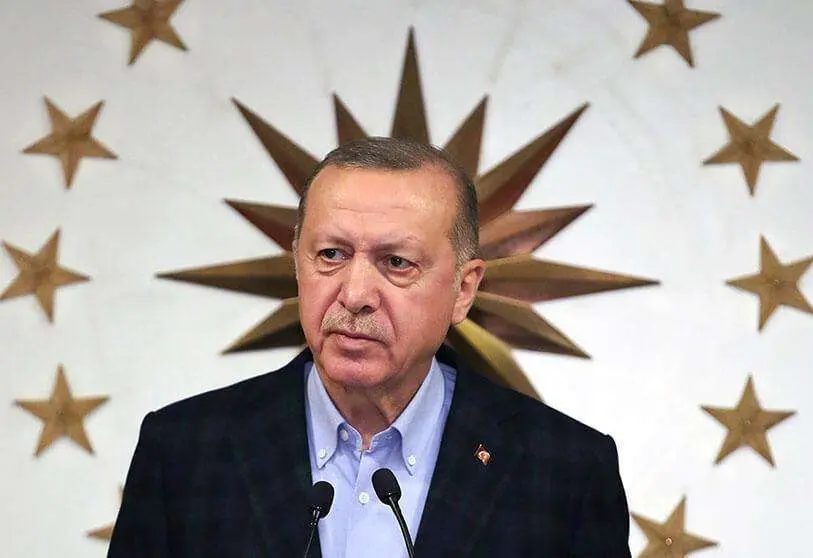Erdogan looks for political allies in Turkey

The conflicts in which he is involved in his immediate environment, Syria, Libya or Nagorno-Karabakh, the tension with allied theorists such as the United States and their problems within NATO or with the European Union are not the only issues that concern Turkish President Recep Tayyip Erdogan. On the horizon is the threat of a defeat in the presidential elections planned for June 2023, just when the 100th anniversary of Kemal Ataturk's Turkey is being celebrated.
The situation inside Turkey is almost as convulsive as its foreign policy, which is the result of a forward flight of the Turkish president because of his power-hungry and desire to extend the Ottoman influence in the region, in an attempt to claim a neo-Tomanism that hides the drift of the country. The feeling of an easy victory in the forthcoming elections, guaranteed by political persecution and interference in all public and private spheres, from the armed forces to the press, the judiciary and academia, is fading, despite the current president's eagerness to silence an opposition that is increasingly vocal.
The defeats in the last local elections in the two big Turkish cities, Istanbul and Ankara, have put the AKP and Erdogan on the alert about what could happen from a hypothetical confluence of the opposition to the next presidential elections. Ekrem Imamoglu and Mansur Yavas won the victory in Istanbul and Ankara respectively, supported by the so-called National Alliance, which brought together the main opposition parties, the People's Republican Party (CHP) and the pro-Kurdish People's Democratic Party (HDP). Two other somewhat minority but vital parties, the Party of Good (IYI) and the Party of Happiness (FP), were also part of the alliance.

Erdogan and his AKP already have the support of the Turkish nationalists of the MHP, but in view of the defeats in the epicentres of Turkish life, the president has been forced in the last months to explore other alternatives that would dynamize the opposition alliance and stop its growth. In the case of the two main opposition parties, Erdogan is carrying out a campaign of political pressure at all levels, especially concerning the HDP, which is linked to the Kurds. Some of his most representative figures, such as Demirtas, are directly imprisoned, as are other public representatives of the HDP. As for other people, such as Imamoglu's director of the Istanbul City Hall campaign, Canan Kaftancioglu, and her allies, there are already open cases that could lead to heavy prison sentences.
However, with respect to the other minority parties, which can tip the balance fairly evenly, Erdogan is pursuing another strategy. The IYI is the result of a split from the MHP, Erdogan's ally and a markedly authoritarian party, which also includes disenchanted representatives of the CHP and represents a more moderate nationalism than that of Erdogan and his partners, but nationalism after all. The PF, for its part, is markedly Islamist, something that favours synergies with the course Erdogan has set for Turkey.
The Turkish president has seen in these two parties, especially the Happiness Party, the possibility of establishing links with which to attract disenchanted voters again, with a view to a more than possible second round of the presidential elections. Under the banner of nationalism and Islamism, Erdogan believes he can capitalise on enough votes to remain in the presidency. However, despite the recent meeting with one of the PF's leading figures, Oguzhan Asilturk, nothing concrete has been achieved.

The AKP and Erdogan are in the lowest levels of support since 20 years, around 30%, which shows that there is an almost absolute disconnection between the president and the Turkish society, especially the young people and the urban population. The Islamist drift and the Turkish identityism turns very important segments of the Turkish population against them. Similarly, discontent with the economic and political situation of the country, but linked to a more moderate Islamism and/or nationalism, can increase the ranks of these minority parties that are beginning to threaten the Turkish party system that has been in place for the last decades. If these two figures are added together, Erdogan's presidency is in danger.
The Turkish President has no alternative. He must broaden his alliance and seek the support of other parties to remain at the helm of the country, as a change of course does not seem feasible and the economic situation aggravated by the coronavirus does not help either. The opposition, for its part, must stand firm and withstand great political and judicial pressure, as well as agree on who will be its candidate to confront Erdogan, which will not be easy either. Victory depends on his ability to unite the widespread discontent and represent a large number of minorities and identities that do not fit into the Turkey Erdogan is designing. Finally, the president of the Eurasian country has the advantage of bringing forward the elections, a scenario that many analysts are contemplating and could cause a rush in an opposition that needs to bring together many sensibilities. Doing things quickly would not help to make the decisions and agreements that they must make sound enough to obtain the result that a large part of Turkey is longing for: the end of Erdogan.








